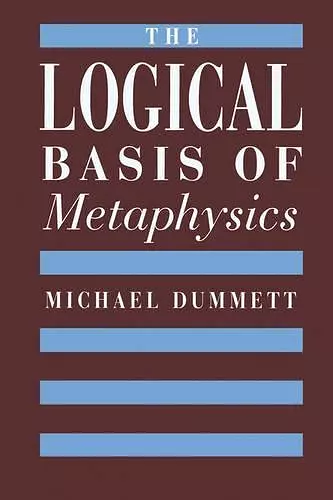The Logical Basis of Metaphysics
Format:Paperback
Publisher:Harvard University Press
Published:31st Jan '93
Currently unavailable, and unfortunately no date known when it will be back

Michael Dummett’s new book is the greatly expanded and recently revised version of his distinguished William James Lectures, delivered in 1976. Dummett regards the construction of a satisfactory theory of meaning as the most pressing task of contemporary analytical philosophy. He believes that the successful completion of this difficult assignment will lead to a resolution of problems before which philosophy has been stalled, in some instances for centuries. These problems turn on the correctness or incorrectness of a realistic view of one or another realm—the physical world, the mind, the past, mathematical reality, and so forth. Rejection of realism amounts to adoption of a variant semantics, and often of a variant logic, for the statements in a certain sector of our language. Dummett does not assume the correctness of any one logical system but shows how the choice between different logics arises at the level of the theory of meaning and depends upon the choice of one or another general form of meaning-theory. In order to determine the correct shape for a meaning-theory, we must attain a clear conception of what a meaning-theory can be expected to do. Such a conception, says Dummett, will form “a base camp for an assault on the metaphysical peaks: I have no greater ambition in this book than to set up a base camp.”
Fundamental issues of human understanding are pursued with moral passion and enormous energy by a real philosopher. The questions Dummett presses reach at least as far as the very limits of thought. -- Barry Stroud * Times Literary Supplement *
Michael Dummett’s The Logical Basis of Metaphysics was very much worth waiting for: the book is important, daring, controversial, and very deep… The overall thesis of the book is that the way to solve metaphysical problems is through philosophy of language, and the large metaphysical ‘pay-off’ the book offers is nothing less than a revision of classical logic! In a nutshell, this means that the principle of Bivalence (the Law of the Excluded Middle) is wrong and Brouwer’s Intuitionist Logic is right! Although the conclusions are dramatic, they are reached by slow and sober steps… Even though I have not been ‘completely converted,’ I have myself learned an enormous amount from this book, and I believe that it marks one of the true high-water marks of twentieth-century philosophy. -- Hilary Putnam, Harvard University
It will be difficult to exaggerate the philosophical interest of the general conclusion that Dummett recommends in this book. If he is right, a large number of issues which have been wrangled over inconclusively, in some cases for centuries, acquire a new sharpness and tractability, with a serious prospect (or worse) that the verdict will go against what has passed for common sense. If he is wrong, as I in fact believe, he is profoundly and importantly wrong, and it is a difficult and pressing task for philosophy to see why… [He has been urging] the general conception in articles and, in passing, in books not primarily devoted to it, for some thirty years. What is new here is the depth, generality, and detail with which he spells out the views about what the theory of meaning must do which have stood largely in the background of his previous writings about realism… This is an extraordinarily important book. -- John McDowell, University of Pittsburgh
ISBN: 9780674537866
Dimensions: unknown
Weight: 499g
366 pages